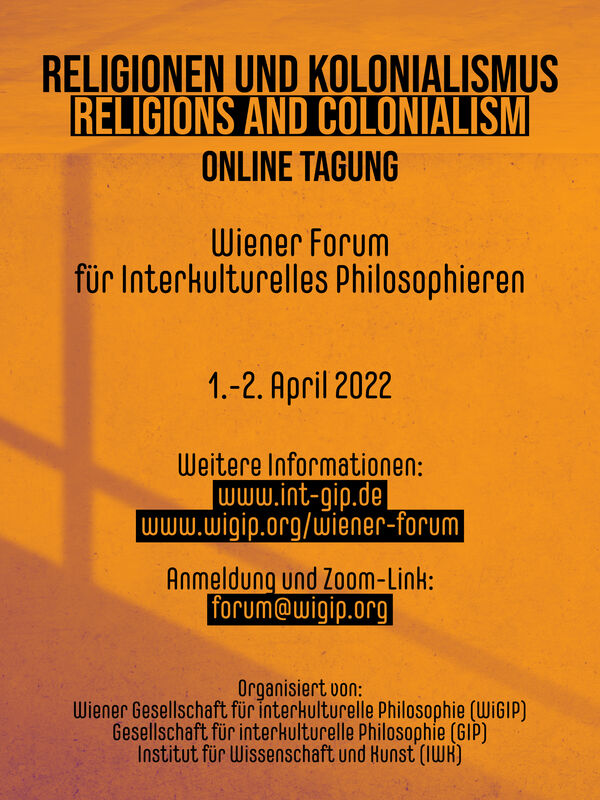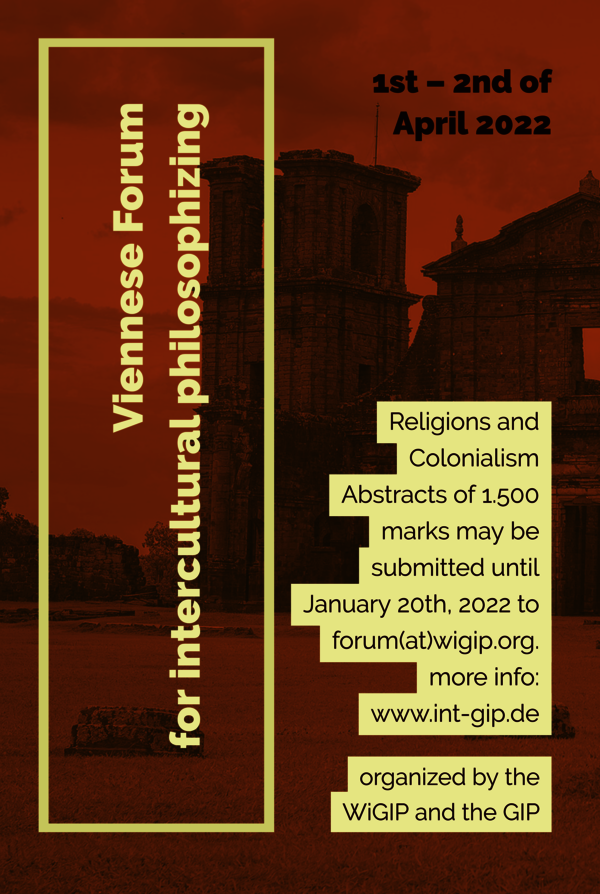Wiener Forum interkulturellen Philosophierens
Viennese Forum for intercultural philosophizing
Das Forum, das seit 2017 von der Wiener und der allgemeinen Gesellschaft für Interkulturelle Philosophie (WiGiP und GIP), gemeinsam mit dem Institut für Wissenschaft und Kunst Wien (IWK) organisiert wird, ist ein Ort des regelmäßigen Austauschs und der Diskussion über Fragen aus dem Bereich der interkulturellen Philosophie.
VI. Forum 2022
Termin: 1. April 2022 (9:00-18:30 Uhr) – 2. April (9:00-16:00 Uhr)
Ort: Universität Wien
Koordination:
Prof. DDr. Franz Gmainer-Pranzl; Prof. DDr. Hans Schelkshorn;
PD Dr. Markus Wirtz; Dr. Hora Zabarjadi Sar
Religionen und Kolonialismus
Bereits in der Antike sind religiöse Bewegungen, die ursprünglich wie das Christentum und der Buddhismus eine herrschaftskritische Haltung entwickelten, zur Legitimationsgrundlage von Imperien geworden. In Indien wandte sich Ashoka dem Buddhismus, in Rom Kaiser Konstantin dem Christentum zu. Eine ähnliche Konstellation zeigt sich in den islamischen Reichen. In der Neuzeit ist mit dem geopolitischen Aufstieg Europas das Christentum eng mit einem global ausgreifenden Kolonialismus verbunden, ein Prozess, in dem von Anfang an sowohl religiös begründete Rechtfertigungen als auch eine Kritik an der transozeanischen Expansion entwickelt werden. Im 19. und 20. Jahrhundert erreichen die europäischen Mächte den Höhepunkt ihrer geopolitischen Hegemonie; zugleich entstehen mit dem Aufstieg der USA und Japans neue imperiale Machtzentren. In Indien, Südostasien und Afrika setzt nach dem Zweiten Weltkrieg ein Prozess der Dekolonisierung ein. In Lateinamerika entwickelt sich seit der Mexikanischen Revolution ein kontinuierlicher Kampf gegen neokoloniale Machtstrukturen. In den heterogenen geopolitischen Konfliktzonen der jüngeren Geschichte gehen religiöse Bewegungen und Institutionen Allianzen sowohl mit den imperialen Machtzentren als auch mit den Widerstandsbewegungen gegen koloniale Unterdrückung ein.
Vor diesem Hintergrund soll im Forum für interkulturelles Philosophieren unter anderem folgenden Fragen nachgegangen werden:
Welche Geltungs- und Wahrheitsansprüche liegen in den verschiedenen Religionen einerseits den Legitimationen andererseits den Formen der Kritik kolonialer Gewalt zugrunde?
Lassen sich typische Argumentationsmuster religiöser Rechtfertigung oder Kritik am Kolonialismus identifizieren?
Welche Beziehungen bestehen zwischen religiösen und säkularen Ideologien kolonialer Expansion und ihrer Kritik?
Wie reagieren Religionen auf postkoloniale Machtkonstellationen?
Abstracts von max. 1.500 Zeichen können bis 20. Januar 2022 eingereicht werden an: : forum(at)wigip.org
Wir bitten Interessent*nnen, kurze Angaben zur Person und zur institutionellen Zugehörigkeit beizufügen.
Organisatorische Hinweise
Konferenzsprachen: Vortragende können jeweils in ihrer eigenen Sprache referieren, wenn längere Zusammenfassungen in Deutsch oder Englisch zur Verfügung gestellt werden
Organisatorische Rückfragen und Anmeldung zur Teilnahme am Forum ohne Vortrag (bis 5.3. 2022) jeweils an: johann.schelkshorn(at)univie.ac.at
Das „Wiener Forum interkulturellen Philosophierens“ kann weder Fahrt- und Nächtigungskosten noch Honorarkosten übernehmen.
Viennese Forum for intercultural philosophizing
The annual forum has been established in 2017. It is organized by the Viennese and the General Society for Intercultural Philosophy (WiGiP;GIP) in cooperation with the Department of Science and Art Vienna (IWK). The forum is a place for exchange and discussion of questions in the area of intercultural philosophy.
Date: 1st of April 2022 (9 a.m. to 6:30 p.m.) – 2nd of April 2022 (9 a.m. to 4: p.m.)
Venue: Vienna University
Coordination: PD Dr. Markus Wirtz; Prof. DDr. Hans Schelkshorn; Prof. DDr. Franz Gmainer-Pranzl
Religions and Colonialism
Religious movements like Christianity and Buddhism, that originally claimed a critical view on imperial power in later times often became a source for legitimizing world empires. Thus, in India, Emperor Ashoka turned to Buddhism; in Rome, Emperor Constantine turned to Christianity. A similar constellation can be observed in the Islamic empires. In modern times the geopolitical rise of Europe is closely linked to Christianity. Since the 16th century, however, the colonial expansion of European powers was an object both of religious justifications and of critique. In the 19th and 20th centuries, Europe reached the peak of its geopolitical hegemony. At the same time, new centers of imperial power emerged with the rise of the United States of Amerika and Japan. In India, Southeast Asia and Africa, the process of decolonization begins after World War II. In Latin America we can observe a long lasting struggle against neocolonial power structures since the Mexican Revolution. In all of these heterogeneous geopolitical conflict zones of recent history, religious movements and institutions enter into alliances with both imperial power centers and resistance movements against colonial oppression.
Against this background, the Viennese Forum for Intercultural Philosophizing will explore the following questions, among others:
Which claims of religious validity and which concepts of truth support the justifications and the forms of critique of colonial violence?
Is it possible to identify typical patterns of argumentation of religious justification or criticism of colonialism?
What are the relations between religious and secular ideologies of colonial power and their critique of these ideologies?
How do religions respond to postcolonial constellations of power?
Abstracts of 1.500 marks may be submitted until January 20th, 2022 to forum(at)wigip.org.
Those, who want to present a paper are requested to give short information about person and institutional affiliation.
Organizational notes
Conference languages: Speakers may present in their own language, if they deliver thorough summaries in German or English (and are able to answer questions in one of these languages.)
Registration and questions concerning organization for participants without presentation (until 5th of March 2022) to johann.schelkshorn(at)univie.ac.at.
The Vienna Forum for Intercultural Philosophizing cannot reemburse any travelling and royalty expenses nor any costs for accommodation and lodging.

